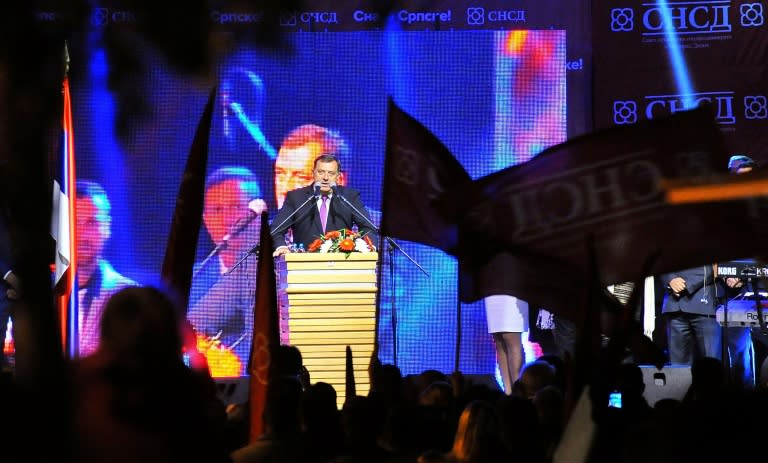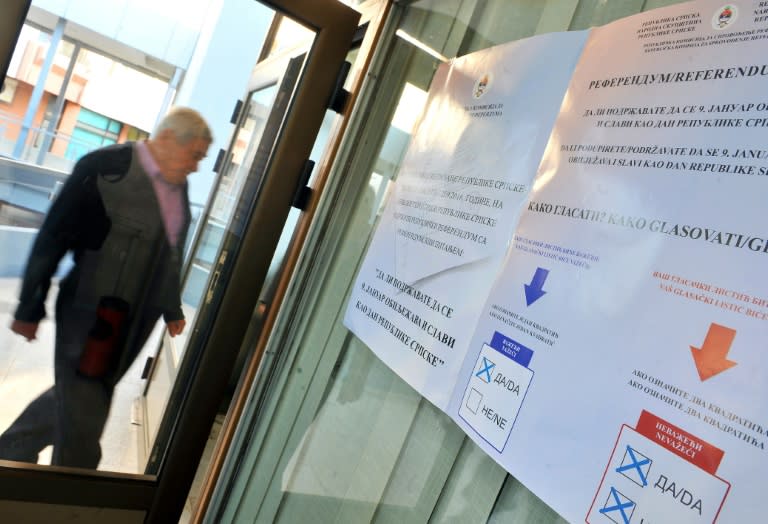Bosnian Serbs vote on disputed 'Republic Day'
Serbs in Bosnia voted Sunday to keep celebrating a statehood day in January, a date tied to the divided nation's brutal 1990s war and a sensitive issue for other ethnic groups. The poll is the brainchild of Milorad Dodik, nationalist leader of the Bosnian Serb-run entity Republika Srpska (RS), which partners the Muslim-Croat Federation in the fragile country. After three-quarters of the ballot had been counted, 99.8 percent of the votes were in favour of keeping January 9 the RS' "Republic Day," officials said. In staging the vote, Dodik flouted a veto by Bosnia's constitutional court, disapproval by the United States and the European Union -- and even the reservations of Serbia, RS' foremost ally. But his initiative was supported by Russia. "Now we know that the public has confirmed January 9 and we know that the public did not want to give up this date," a defiant Dodik told a press conference in the RS parliament in Banja Luka, northern Bosnia. The date of January 9 has huge emotional resonance in Bosnia, stirring memories of nationalist fervour, trauma and bloodshed. It marks the proclamation of a "Republic of Serb people" in Bosnia that took place three months before the inter-ethnic 1992-1995 conflict that claimed 100,000 lives. The founders of that "republic" included Radovan Karadzic -- sentenced in March to 40 years' jail for genocide and crimes against humanity committed during the war that also displaced more than two million people. Some 1.2 million voters were entitled to cast a ballot, and the voting passed off without incident. "I came to vote because every nation and every state has its own national holiday. Accordingly, our Serbian people must have their holiday," said Vojo Vujakovic, 60, at a polling station near Banja Luka. Bosnia's constitutional court had cancelled the referendum, ruling that the holiday is illegal for discriminating against non-Serbs, but Dodik pressed ahead regardless. Valentin Inzko, the international envoy to Bosnia, described the vote as "pointless" and declared it was void of "any legal consequences". "This referendum has sparked a lot of tension... but there won't be war," he added. - 'Playing with fire' - "The Republic is going into a referendum. It's a great day for our Republic and our people," Dodik said on Friday after a trip to Moscow, where he met Russian President Vladimir Putin. "We have to show our dignity, that we are a democratic people and that we have the right to make our own decisions," he said. But Bosnian Serb opposition representative Mladen Ivanic denounced the poll as "adventurism" and vowed not to participate. The Dayton peace agreement that ended Bosnia's war split the country into two semi-independent entities, the RS and a Muslim-Croat Federation. But analysts say that the institutional bonds between the entities remain weak and prone to instability. Some fear Dodik is warming up for a referendum on the independence of RS, which he has repeatedly threatened to carry out. Bosnian Muslim leader Bakir Izetbegovic reacted angrily on Sunday night. "This is a blatant exempt of a breach of the Dayton agreement, of obstructing decisions by the Constitutional Court, of violating the penal code," he said. "The only question is when there will be a reaction to this and the form it will take," he said, without elaborating. Izetbegovic had earlier accused Dodik of "playing with fire", and a wartime commander of Bosnian Muslim forces, Sefer Halilovic, accused him of "crossing the red line". But some commentators say a conflict is unlikely and suggest a crisis is being stoked to boost nationalists' chances in upcoming local elections.




